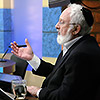How Many Roads Lie Before Us?
 Question: A knight stood at a crossroads, looked at three ominous signs, and went home to learn to read. First the question arises: how many roads do we actually have before us? Each one has something written on it. Can you tell me what is written on them that we do not understand? We, who have finished school, are PhDs, Doctors of Science, we do not understand what is written. We need to go back and somehow learn to read. What is written there?
Question: A knight stood at a crossroads, looked at three ominous signs, and went home to learn to read. First the question arises: how many roads do we actually have before us? Each one has something written on it. Can you tell me what is written on them that we do not understand? We, who have finished school, are PhDs, Doctors of Science, we do not understand what is written. We need to go back and somehow learn to read. What is written there?
Answer: It says: “Do not seek happiness, but uncover it within yourself.”
Question: And somehow we cannot read it. What is it about it that I do not want to agree with and go down this path? Or even read it.
Answer: Because there is no road actually. There is no road. It is just a stone that stops you. And now you have to learn how to achieve that inner freedom where you stand. In principle, you do not need to go anywhere. Standing before this stone now, you must find the truth. That is, a person must go inside himself. And then it will work out for him.
Question: What will I find there within myself?
Answer: You will find yourself: who I am, what I am, what for, why, and what I want to find. You will find all that only within yourself.
Question: We say that the nature of a person is largely understood. It is the desire to receive—egoism. What will I find there besides that?
Answer: Everything starts with egoism.
Question: So the starting point will somehow be there. I will understand that this is my nature; is that it?
Answer: Yes, and how I can control it, this nature of mine.
Comment: So, I feel that it does not lead me to great happiness.
My Response: It does not lead me to happiness. It has led me onto this road, and I must continue along it. Where? What? Nothing is known, and there is no point. And I will search for it during all my miserable remaining years until I return to the same stone, at the same crossroads, only now tired, gray-haired, like Don Quixote on a dead horse. And that is it.
Question: And that is it? And is it my nature that has spun this for me?
Answer: Yes.
Question: This contemplation, is it better to happen sooner rather than later?
Answer: Of course!
Question: Is this the road that I must scrutinize?
Answer: Yes.
Question: Is it every person’s destiny to come to the “stone” and stand before it like this?
Answer: Everyone has such an opportunity. But to what extent one is willing to be content with this, to stop at this, I do not know.
Question: So, you think that many of those who set out on those roads, go down those roads, it is all wrong?
Answer: Yes.
Comment: Our ego leads us, demands, and we run along the roads? But we should stop, not rush anywhere.
My Response: We should stop, think, and turn back.
Question: And turn back home?
Answer: Yes.
Question: It says here: “Return home, learn literacy.” Learn literacy. What does it mean to learn literacy?
Answer: To learn literacy means to correctly decipher the questions that arise in your heart. These are actually the questions. And literacy, I would say it is like what your heart tells you. Learn to listen to it, to talk to it, and to be satisfied with what your heart suggests to you.
Question: The heart, what is it?
Answer: The heart is my “self.”
Question: It is not the mind?
Answer:: No, the heart is me. And I want to feel myself, know myself, uncover myself as if I am speaking to myself and standing before myself. It means to speak with your heart.
Question: So I need to truly stand before myself? And all this time I am running away from this “self” of mine?
Answer: Yes, we are running away from ourselves. I always stand before myself, and I run away from it.
Comment: There must be something there that we do not want to know.
My Response: I do not want to talk to it.
Question: Is that literacy? To learn literacy is it to speak directly with myself?
Answer: Yes.
[325996]
From KabTV’s “News with Dr. Michael Laitman” 1/15/24
Related Material:
The Meaning Of Life Is Here And Now
Striving To Reveal The Meaning Of Life
Expand The Meaning Of Life















